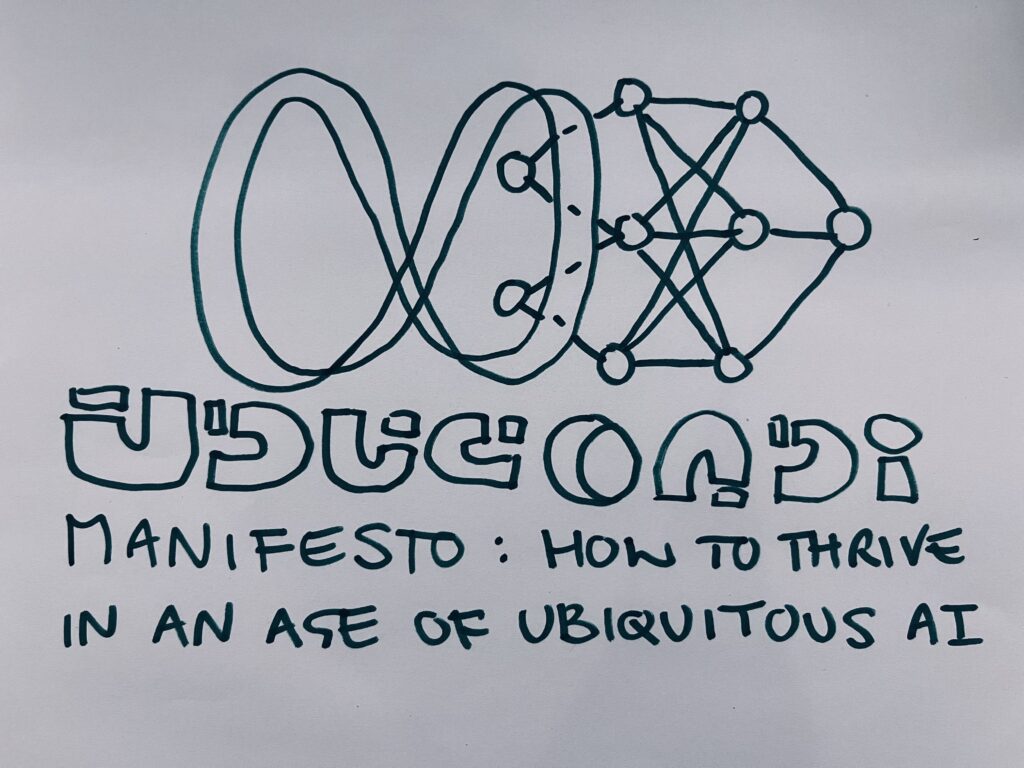
JabeOnAI, A Manifesto: How to thrive in an age of ubiquitous AI.
Over the last 30 years the most influential trend in cognitive science – arguably has been the rise of 4E cognition as a theoretical under-pinning (at a later date I will explain the Lorenz attractor intertwined with the cartoon Artificial Neural Network in the teaser image). The other side (not so much based on Cognitive Science, but loosely described as AI) where most progress has been made is in Machine Learning which is mostly engineering and heuristics. These two themes from late 80s have been divergent but both influential, I believe that the two can profitably be combined.
Don’t get me wrong, these current AI systems are great, but they are also seriously misunderstood, and their failings are starting to cause doubts. I say AI systems are best understood as an art form, not as a form of true intelligence. They are I say “the Poetry of Liquid Sunshine”. That is to say, as we create: software code, feature engineering, ML architectures, as we undertake data curation; and, what we write and create, and we compile, and run is akin to Poetry. And at least currently they are implemented with electrical current (the analogy there being to liquid sunshine flowing through the circuits). There is a serious point to this lyrical framing – which is that we are starting to see the current optimism around Generative AI fade, and the challenges our society faces, are I think too serious to let that happen (we need AI systems to help address the climate emergency amongst other things).
I feel this is worthy of a Manifesto. We need to understand how to engineer these systems, to have a deeper understanding of what we ourselves are as conscious human beings; and, finally, we need a way forward to being happy, productive, and secure with ubiquitous AI technology all around us.
These three elements I feel form the basis of a manifesto, for what I am seeking to do with JabeOnAI; and I see a strong connection, to what I call practical Cognitive Science as a way to guide us on this journey. So the three themes are, to repeat:-
- Creating effective AI systems (We need to understand how to engineer these systems). As a quick review of a bunch of challenges being faced by the current AI systems, such as:
- The realisation that LLMs don’t reason ( https: //arxiv.org/abs/2205.11502 );
- An inability to reliably interface with external tools: https://arxiv.org/abs/2308.05713
- An instability overtime (making them difficult to engineer into larger systems). https://arxiv.org/pdf/2307.09009.pdf
- The implications of adversarial attacks (https://arxiv.org/abs/2307.15043)
And my Talk at BioIT a few years back – which I intend to elaborate on in more detail:
https://www.elsevier.com/connect/why-data-science-is-an-art-and-how-to-support-the-people-who-do-it
2. Understanding ourselves (to have a deeper understanding of what we ourselves are as conscious human beings)
I couple of examples of applying neuroscience and cognitive science insights to understanding ourselves that are worth checking out are:
- https://www.newyorker.com/magazine/2017/08/07/what-meditation-can-do-for-us-and-what-it-cant
- https://www.penguin.co.uk/books/313594/the-experience-machine-by-clark-andy/9780241394526
3. Living with ubiquitous AI (a way forward to being happy, productive, and secure with ubiquitous AI technology all around us)
Where there seems to be a growing industry of advice for young people about how to prepare for the current world of ubiquitous AI we find ourselves in and the near future implications: but I think we can do a better job than what I have seen so far; a recent example can be seen here: ‘Be flexible, imaginative and brave’: experts give career advice for an AI world: https://www.theguardian.com/technology/2023/aug/29/experts-give-career-advice-ai-world-artificial-intelligence-work?CMP=Share_iOSApp_Other
More soon, from JabeOnAI …